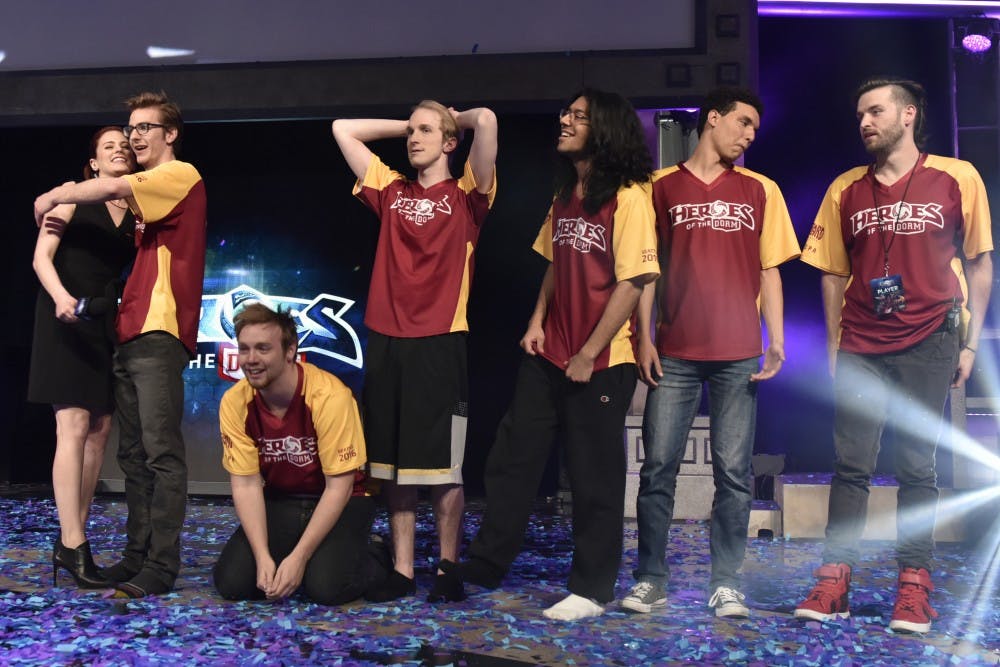The world of eSports has seen a meteoric rise in recent years. ASU has been a major part of that elevation, despite its underground status on campus, and it has promoted at least one alumnus to become a national figure in the competitive scene and caused a new generation of students to aim for professional teams.
ASU alumnus Sean Gares professionally competes in the first-person-shooter "Counter-Strike: Global Offensive (CS:GO)" with European professional group Team Misfits. Gares was previously in the spotlight not for his performance while playing, but for speaking out against the Professional Esports Association, or PEA, as one of the supporters of an open letter regarding player's rights in the league.
Watch live video from sgares on www.twitch.tvBack at ASU, what was once an underground subculture of video games is now gaining traction partly due to high profile players such as Gares and the "Dream Team" from the school who won the Heroes of the Dorm national "Heroes of the Storm" tournament last year.
Public service and public policy junior Michael Carlton is the president of the ASU eSports Association. The group’s umbrella encompasses titles such as fighting game series “Smash Bros,” “League of Legends” and digital card game “Hearthstone” on campus.
However, Carlton said the road to the professional leagues is full of difficulty as there is not enough infrastructure in the U.S. for a clear path to professional eSports play.
“It’s not like basketball or football where occasionally there’s open tryouts, or you get invited, or you have to go through college or go through contracts and get picked up,” he said. “eSports is all under the table, behind closed doors, Twitter messages ... everything. Nobody really knows until something is set up.”
Carlton believes taking the collegiate road to going pro is one of the best routes. He referenced universities such as the University of Irvine, which currently has scholarships for varsity League of Legends players, and said that other schools were generating that same support.
Carlton also mentioned the physical amenities provided by schools, such as practice spaces for teams, places to rest and stable internet connections, as positives for playing through a college rather than attempting to go pro without that support.
“I believe that there is a world where eSports and college can co-exist, where I can pursue my dreams in eSports while still getting an education. I will always preach that," he said. "Every time I think about eSports I want to make sure that these players are well-educated as well as pursuing what they love doing.”
Carlton said ASU has some of the most talented players in the world, but they are unknown.
“If you really think about it, we’re a growing population," he said. "We have a large amount of foreign students. Those cultures support eSports a lot more than America does.”
The players Carlton referenced are top-ranked, including the ASU "CS:GO" team, whose members are amongst the game’s “Global Elite” — the highest rank available.
His dream structure for official support for eSports would be scholarships, and access to tutoring like other student athletes.
“The amount of time people dedicate to their sport is similar to the amount of time we dedicate to gaming,” he said.
He also wished for class structure as well, with health classes structured for eSports players that stress proper posture, dieting and nutrition.
Aerospace engineering sophomore Philip Mulford is the coordinator for the association’s “StarCraft 2” team. For him, going pro would be an impossibility, he said, considering the time he puts towards his education.
Mulford said players who do aspire to be professional would still deal with the problems plaguing the eSports industry.
Speaking specifically about "StarCraft 2," Mulford stressed the importance of legality and having a player contract. He referenced a situation that occurred three years ago, when professional team Quantic’s owner disappeared.
“Before the team finally disbanded, he hadn’t paid salaries for five months,” Mulford said, adding a similar occurrence had happened to European team Love Your Girlfriend.
“The problem is, you have the players and you have the teams,” he said. “A lot of players aren’t even signing contracts, or signing something legally binding that allows them to take their team to court if salaries aren’t paid.”
Mulford said that there have been talks of pro players unionizing, but that has yet to happen.
Clarinet performance and musical education junior Char Elizabeth runs the “Super Smash Bros. Melee” weekly tournaments on the Tempe campus every Friday. She said the key thing a player should look for when joining a team is transparency among their sponsors.
“If a sponsor isn't transparent in their finances, expectations or feedback to their players, that can cause huge consequences farther down the line,” she said. “In my experience, this seems to be the number one reason that players will drop sponsorships.”
For all of these reasons, many of the eSports players at ASU have put the dream of professional play on hold for their education, but hope as the activity becomes more mainstream, both on and off campus, they can devote more time and energy to their passion.
Reach the reporter at djulienr@asu.edu or follow @legendpenguin on Twitter
Like The State Press on Facebook and follow @statepress on Twitter




